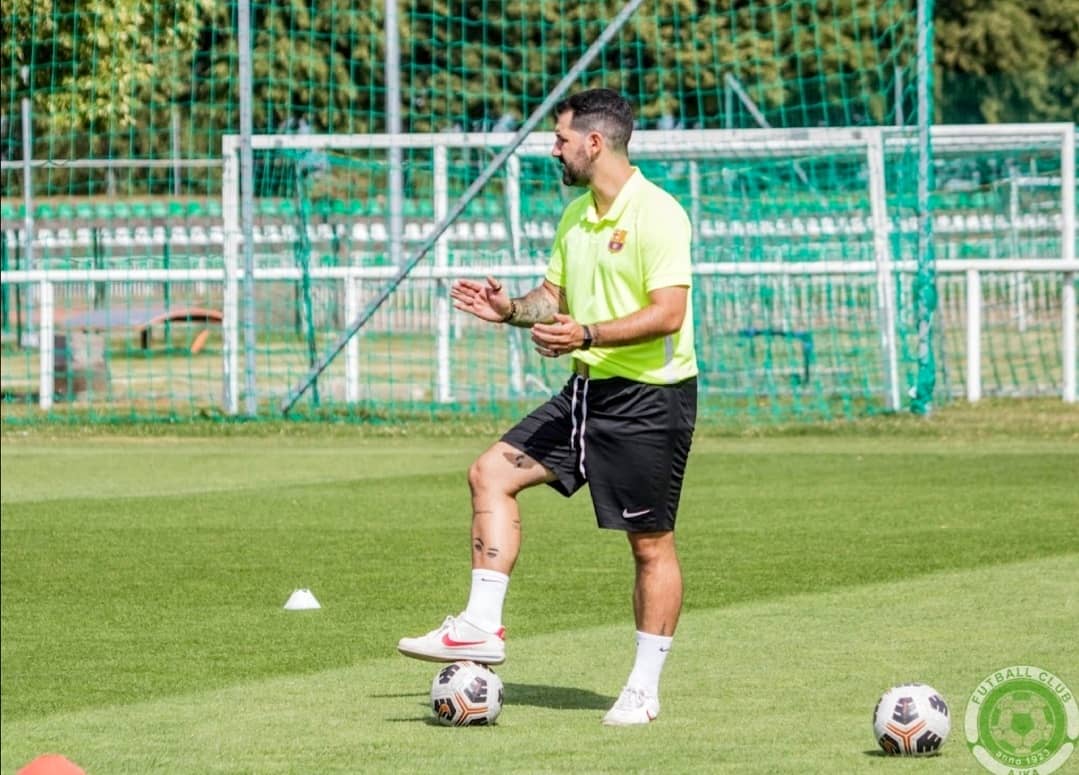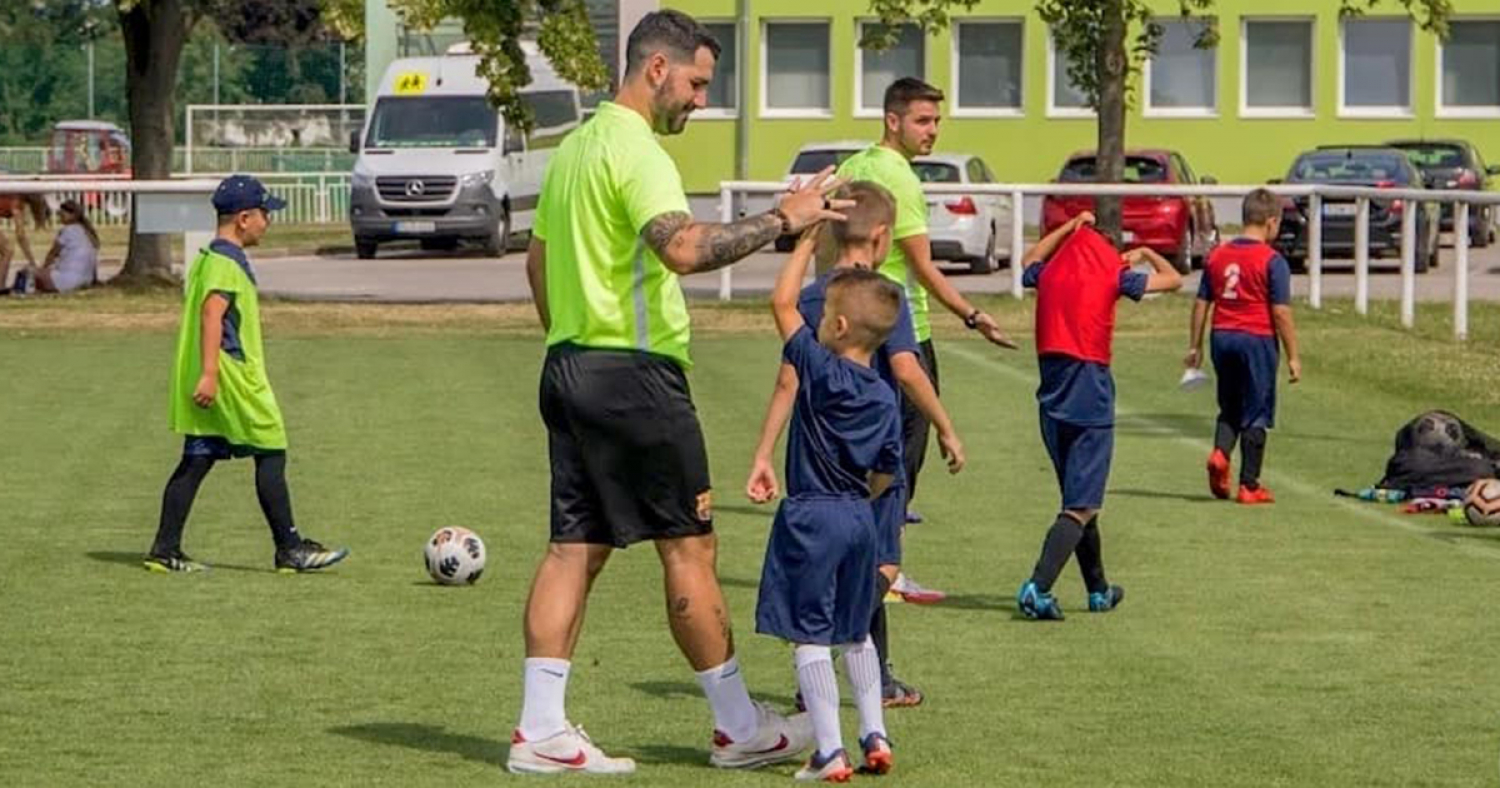- How are your days at the academy? Have you managed to get into the rhythm of everyday life?
- Great! The new colleagues and the kids are fantastic, I feel like I've found a common voice with everyone and I have a good relationship with my peers.
- Tell us a bit about yourself! Describe a day in your life, please.
- In the mornings I go to the gym to work out if I have time. I have a training session from 4pm, before which I arrive at the track a good hour before. I meet regularly with Martí to talk about what's going on at the academy. In my free time I like to go for a walk with my girlfriend and watch football and tennis on TV.
- It is never easy to move to another country, away from family and friends. Did you find it easy to accept the idea of moving abroad?
- As a matter of fact, I am in a lucky position. My girlfriend works in Budapest, and I've been to the country quite a few times myself, so I wouldn't say it was completely unfamiliar. I had previously worked in Jordan for three years at the local academy, which was also an advantage when I moved. To be honest, I'm much happier in Hungary because I can be closer to my loved ones.
- How do you see the time that has passed? Have you found it easy to adapt to everyday life at the academy? Were there any familiar faces?
- I arrived in Budapest in July, at the beginning of my preparations, for an extended stay, and after six months I can say that it was very easy to settle in. A big part of that was my colleagues, who were very welcoming. It also helped that I speak the same language as most of the coaches, and my Hungarian colleagues were (and still are) helpful in interpreting, so it was easy to get on with the guys. By the way, I know Martti from before and Jordi and I have worked together for ten years. I talked to him a lot before I came here, asking his advice about this opportunity.
- As you said before, this is not your first assignment abroad, as you have worked in the Middle East for three years. The Budapest Academy was launched exactly three years ago, so you could say that we are still at the beginning of the mission. What were your expectations when you accepted the offer?
- First and foremost, we wanted to introduce the children to the system and style of play that has been developed in Barcelona. In Jordan, similar processes were taking place, the only difference was the players and the colleagues - and of course the culture. Now all coaches have the same goal: to grow, to help players and to build their future careers.
- As well as the academic goals, you obviously have your own milestones. Do you have a specific vision of where you want to see yourself in the future?
- I don't like to talk about my future because it is very uncertain, but I can say that I would like to move back home to Spain in a few years and continue working there. In January I will take a break because I need to rest. Of course, I am also motivated to become a professional coach, but for the time being I would like to stay with the children.
- What qualifications do you have as a coach?
- I currently have a UEFA-A licence and my main goal is to obtain a UEFA-Pro qualification. Two years ago, I did a master's degree in sports psychology in Jordan.
- You are currently training with the 2006 Reds and 2007 Blues. What is your relationship with the boys like? Are you satisfied with them?
- I can't say, it was a difficult start. The 2006 age group was initially represented by eight players, but several players left the club, so it took some time to get the right number of players. My experience with them is that they are very skilful, I can see the determination and professionalism, although sometimes it is difficult to keep the focus on football - the world opens up for them at that age. It's also great to work with the 2007 age group, I've coached twenty-two players, which is very important for me, because it gives me a greater opportunity for immersion and also because the players are not overworked.
- How do you see players in your teams who stand out from their peers and have a bright future ahead of them?
- As I see it now, I have some players with excellent skills who can take us to the professional level. However, you have to see that it is very difficult to perform consistently well, and this is also the case at senior level. Obviously, there are many factors that play a role in a successful future - your relationship with your coach, your vulnerability - but it's perseverance that determines everything. At this age, especially with girls and parties, it's hard to concentrate on just playing and learning, and players have to be careful not to get distracted from their goals or overwhelmed, which can discourage them from playing, which is the worst that can happen.

- A coach has to be able to handle that too. Warn the players about the right lifestyle and nutrition. This goes beyond the concept of a simple football coach, who just runs training sessions and thinks about tactics. Do you have any individual techniques that you use to push the boys in training and matches? What advice do you give them off the pitch, talking about getting the right amount of sleep or eating right, for example?
- I don't like to write laws off the pitch as I'm not a policeman telling you what you can and can't do. They're almost semi-professional players and at their age they need to know where the line is. For example, if there's a game on Saturday morning, I spend Friday night relaxing, not having fun. If you don't concentrate 100 percent on the game, you can lose a promising opportunity: someone else will play for you, you'll be tired, distracted. A footballer is defined not only by his playing ability, but also by his attitude off the pitch.
- The academy has a big role to play in this (off-the-field attitude - ed.).
- You are absolutely right! Our academy has core values that we are as proud to represent here in Budapest as we are overseas or in Barcelona. Anyone who is part of this community - be it a player, a parent, a coach - must follow these values, both inwards, towards themselves, and outwards, towards their opponents. The academy also teaches, prepares and educates for life, and most of life is not played inside the white line, but outside it.
- How do you motivate your players?
- Before the matches, there is less talk about the game system, as we practice it every day in training, I try to get them fired up. Every player is different: some need more motivation, some less. Some need to sit down and talk through the exercises one-to-one and some just need a group talk. In many cases, it is necessary to unravel the mystery of what might be behind the poor performance. It could be a fight at home, a bad grade at school, it is our job to uncover and correct the situation. It is important to know the players' feelings, but even more important to influence them and encourage them to keep working hard.
- Is there a moment that has really struck you in the last six months?
- There was a match that my family came to see, so I wasn't just happy because of the win. The other factor I would highlight is that I had players I could count on from the beginning to the end - I would like to say a special thank you to them!
- It's an inevitable question, as it has come up in all the interviews so far. How do you see Hungarian cuisine?
- Divine! My great favourite is horn soup, but of course, like my colleagues, I don't despise goulash soup when it's served to me.
- You've been living here for months now, so you've had a chance to get a taste of Hungarian football culture. What do you think about the future prospects of the Hungarian national team?
- Hungarians are a football-loving people and they have great teams like Ferencváros, Fehérvár and Puskás Akadémia. They were also a surprise team in the death group at last year's European Championship. Our aim is to produce players from the academy who will be of benefit to the whole nation. The country is on the right track and I look forward to seeing what the future brings.
- Have you ever cheered live for a Hungarian team in the stands?
- Of course! I watched the home game of Ferencváros against Monaco, in which the Hungarian champions qualified. I hope the Hungarian champions will meet Barca in the Europa League, that would be a great experience!
Kristóf Bartha




